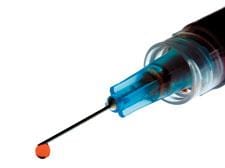An HIV vaccine in development for more than 20 years is nearly ready for clinical trials, say researchers at the University of Western Ontario.
By using a genetically modified version of an entire HIV virus, Chil-Yong Kang, lead researcher on the project, hopes the vaccine will stimulate the body’s immune system to create antibodies that resist HIV infection, much like the vaccines against polio, rabies and flu viruses.
The HIV virus found in the vaccine, “is nonpathogenic, in other words, it doesn’t cause any disease,” says Kang. “The vaccine will hopefully induce protective immunity against HIV infection.
“No one seems to know what component of the HIV virus is supposed to be used to create the vaccine against HIV and AIDS,” says Kang. “There have been several failures in the past using part of the AIDS virus component,” he adds, reflecting on the recent failure of a Merck vaccine, which was scrapped after it made some patients more susceptible to infection, not less.
But Kang believes that his vaccine will be effective because it takes a different approach. “History tells us that the whole-virus vaccine works,” he says. “We are using the conventional wisdom to create an HIV vaccine. It works in other diseases and I don’t see why not for HIV and AIDS.”
The new vaccine has already been tested in animals, Kang says, but is now ready for human trials. The vaccine for the trials has already been manufactured at a laboratory in the United States and is ready for testing.
If proven safe, human trials will unfold over three phases. Initially the vaccine will be tested for toxicity; researchers will determine if it is safe for use in humans. Next it will be evaluated to see if an immune system response occurs when it is introduced into the body; does the body’s immune system attack the vaccine? Finally in phase three researchers will evaluate the effectiveness of the vaccine at preventing HIV infection; does it stop HIV-negative people from becoming HIV-positive?
Kang projects human trials will begin in the spring of 2009, but warns that if the vaccine proves successful it will take up to eight years before it is ready for general use.
Even so Kang remains optimistic. “Hopefully it can save millions of lives,” he says. Kang’s research has led to what he hopes will be both a preventative treatment and a cure for those who are HIV-positive.
Meanwhile in October at the international AIDS vaccine conference in Cape Town, South Africa, scientists warned that because of global economic turbulence funds for HIV/AIDS research would become more difficult to secure. Reportedly even large charities such as the Bill and Melinda Gates Foundation may cut funding to research projects, or choose to not increase spending.
In an interview with the Associated Press, Alan Bernstein, head of the Global HIV Vaccine Enterprise says the outlook for breakthroughs during the economic crisis is bleak.
“It’s not good news for research in general and vaccine research in particular,” Bernstein says. “It has been a very turbulent year.”

 Why you can trust Xtra
Why you can trust Xtra


